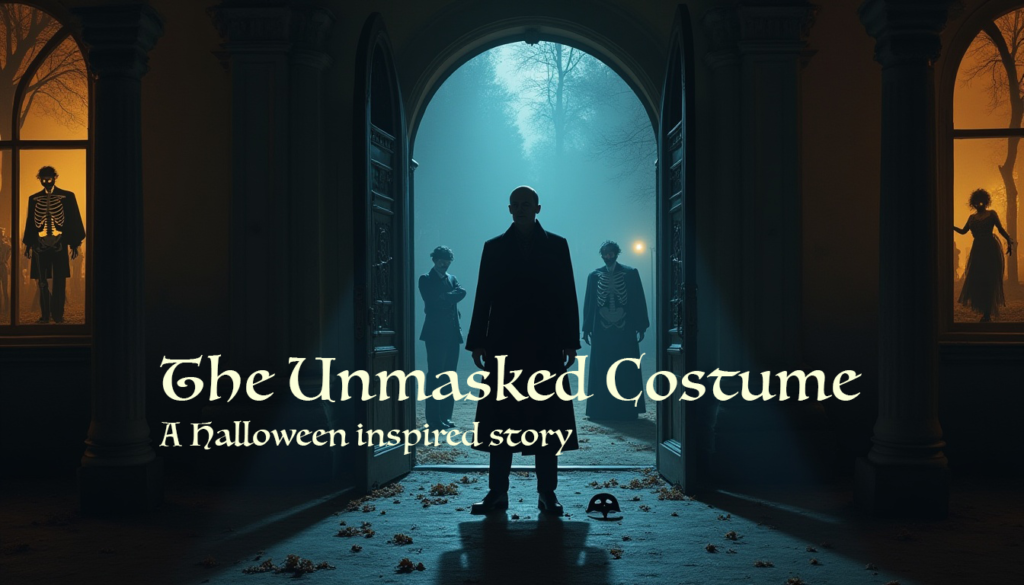The Unmasked Costume

He arrived at the Halloween party without a costume. Or rather, that was his costume—the absence of one.
The hosts greeted him at the door with champagne and confusion. “Oh! You’re… sorry, have we met?” They squinted at him, their faces painted like elegant skulls, their smiles frozen in theatrical death. He told them his name. They laughed, delighted. “Of course! How silly of us. You look so different tonight. What are you supposed to be?”
“Nothing,” he said. “Just myself.”
They laughed again, assuming this was part of the joke, and ushered him inside.
The party swirled with monsters and angels, superheroes and corpses. Everyone was someone else, which meant everyone was comfortable. He moved through the rooms like a ghost, solid but somehow transparent. People approached him with the tentative curiosity reserved for strangers.
“Do I know you?” asked the woman dressed as Cleopatra. He’d known her for six years. They’d shared lunch every Thursday.
“I think so,” he said.
She tilted her head, studying his face. “You seem so familiar. Like someone I used to know, maybe?” Her eyes lingered on his features—unadorned, unconcealed—searching for the reference point that wouldn’t come. After an awkward moment, she excused herself to refresh her drink.
By the fireplace, his colleague—a werewolf with magnificent prosthetics—shook his hand like a stranger’s. “Great to meet you. Whose friend are you?”
“Yours,” he said quietly. But the werewolf had already turned to someone else, someone in costume, someone recognizable.
He found himself standing alone near the window, watching his reflection in the dark glass. His face looked strange to him too. Without the usual animation—the practiced expressions, the responsive smiles, the adaptive enthusiasm—it seemed oddly still. Unreadable. Almost familiar.
A devil sat down beside him, horns gleaming. “Rough night?”
“Do you recognize me?” he asked.
The devil considered this seriously. “Should I?”
“I don’t know anymore.”
They sat in silence. Around them, the party continued its elaborate dance of borrowed identities. Everyone was laughing, touching, performing their temporary selves with commitment and joy. He watched a man in a vampire costume become suave and seductive in a way he never was at the office. He watched a shy woman transform into a bold pirate, commanding attention. They were all so alive inside their disguises.
“You know what’s funny about Halloween?” the devil said, swirling their drink. “Everyone thinks they’re pretending to be someone else. But really, they’re just trying on different parts of themselves. The parts they keep hidden the other 364 days.”
He looked at the devil’s face beneath the makeup and horns. He couldn’t tell who they were either.
“So what are you when you’re not in costume?” he asked.
The devil smiled, sad and knowing. “I’m not sure I remember anymore.”
As the night wore on, he began to notice something. Each person he spoke to would shift slightly when they approached him—recalibrating, searching for the right frequency. Without his usual masks to guide them, they couldn’t find their footing. Conversations stumbled. Eyes drifted. They were looking for the version of him that would tell them which version of themselves to be.
He’d removed his mask expecting to find something underneath. Some true, essential self that would finally be seen. But standing there, unrecognizable to everyone who knew him, he began to understand: there was no face beneath the mask. There were only other masks, older ones, going down and down like layers of wallpaper in an ancient house. Each one chosen, adapted, worn smooth by use.
The self he’d thought he was hiding didn’t exist.
The self he was trying to reveal didn’t exist either.
There was only this—this adaptive thing, this responsive surface, always becoming whatever the moment required.
Near midnight, he slipped outside into the cool October air. The street was quiet except for the distant laughter of late trick-or-treaters. He stood on the sidewalk, watching his breath form clouds in the darkness.
For a moment, standing alone, he felt the strange vertigo of his own absence. Not sad exactly. Not lost. But aware—deeply aware—that he was always and only ever a performance, even to himself. Especially to himself.
Inside, someone called his name. He heard it through the window, distorted by distance and glass.
He took a breath and felt something shift. Not a decision, exactly. More like a recognition. He could put the mask back on. He would put the mask back on. There was no other option, really. The mask was all there was.
But this time, he would know he was wearing it.
This time, when he smiled and nodded and became what the room needed him to be, he would feel the seams. He would sense the construction of it, the architecture of personality built from nothing but repetition and response.
He walked back inside. Someone handed him a mask—a simple black one, generic and forgettable. “Found this in the closet,” they said. “You need a costume, right?”
He put it on.
Immediately, recognition flooded back. “Oh my god, there you are!” Cleopatra embraced him. “We couldn’t find you anywhere!” The werewolf clapped him on the shoulder. The hosts pulled him into conversation. He was visible again. Known again.
He laughed with them, spoke with them, moved through the party like water finding its shape in whatever container held it. But beneath the mask, behind the performance, there was a small, quiet awareness now—a consciousness of the play itself.
He was the mask. The mask was him. There was no difference, no gap to bridge.
And somehow, knowing this, he felt more free than he ever had pretending there was someone real underneath, waiting to be found.
The party continued until dawn. And when he finally left, walking home through streets littered with discarded costumes and candy wrappers, he kept the mask in his pocket.
Just in case he forgot again.
Just in case he needed to remember what he’d learned: that the choosing itself was the only authenticity available. The awareness itself was the only truth.
We are all always wearing masks.
The question is only whether we know it.
And on the night when everyone else pretends, maybe that’s when we can finally see clearly—that we’ve been pretending all along.
